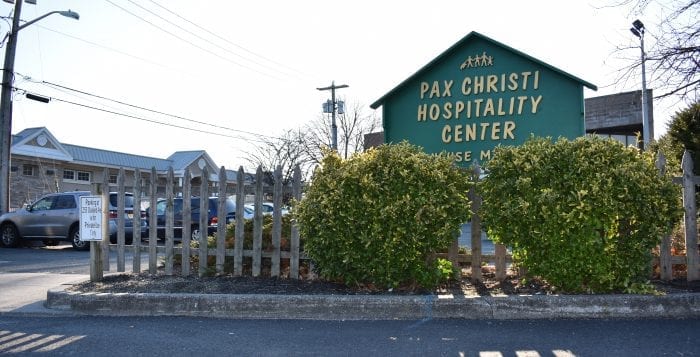The COVID-19 crisis has affected daily life for every resident, but it has especially created challenges for individuals seeking essential resources, and for the workers and volunteers who provide them. The ongoing health crisis has caused numerous facilities including homeless shelters and other nonprofit organizations to rethink how they operate for the time being.
For Stephen Brazeau, director of Pax Christi Hospitality Center in Port Jefferson, it has been business as usual at the facility, with a few exceptions.
“We’ve had an open-door policy at the center, but now we’ve locked the front door and have begun screening individuals who want to come in,” Brazeau said. “We usually have significant walk-in traffic and we’ve definitely seen a reduction in that.”
The director said they have seen anywhere from a 60-70 percent decrease in walk-ins.
Currently, the hospitality center has a total of four staff members working with a few volunteers, compared to an additional 10 interns and 40-plus volunteers, due to Gov. Andrew Cuomo’s (D) executive order limiting operations. Brazeau said the center’s 24 beds are occupied, and for individuals they can’t accommodate they are trying to set them up with an official from the county’s department of social services.
“We are doing our best to make sure these services and basic needs are continuing to be offered,” he said. “At the same time, we want our workers to be safe as well.”
In 2016, 3,960 individuals were deemed homeless on Long Island but more than half of those were children, according to a Long Island Coalition for the Homeless survey count. More than half of the surveyed homeless were children.
The Centers for Disease Control and Prevention has recommended homeless shelters minimize face-to-face staff interactions with clients, and limit visitors to the facility during the outbreak.
The state Office of Temporary and Disability Assistance said in a directive to shelter providers, “congregate facilities, such as shelters for individuals experiencing homelessness, are especially at risk for the spread of communicable diseases due to the number of individuals living in close proximity.”
Brazeau said he is also concerned about undocumented individuals who may need a place to stay as well as food.
“A few of the places that they go to for meals have closed, so we have tried to lead them to churches, schools and other places that are offering them,” the director said.
For Celina Wilson, president of the Bridge of Hope Resource Center, she and her staff have had to adjust on the fly. Moving away from face-to-face interactions and meetings, they now try to do most of their work through phone calls and other technological means.
“Even though we are limited in mobility, we are still able to help and advise our clients on a number of issues,” Wilson said. “We call them, text them, FaceTime them and we walk them through whatever they need help with.”
The Port Jefferson Station-based resource center provides a number of counseling, mentoring and education services. It is working on a graphic informational guide on the coronavirus that will be published on its website. In addition, the center will list other resources available on the Island like sites for mobile food distribution.
“At this point we have to work together to get through this and keep people informed,” Wilson said.






